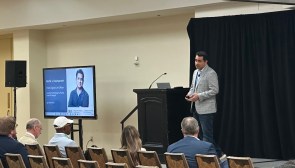Low-quality data makes AI stupid, says Virginia’s data chief

States interested in using the latest artificial intelligence technologies to support their operations will need clean, reliable datasets, Ken Pfeil, Virginia’s chief data officer, said during an event Wednesday.
Speaking at the final session of a Washington D.C. event hosted by the software company Informatica, Pfeil shared some of his office’s newest data projects, such as a new predictive analytics program for cybersecurity and efforts to support public mental health issues and the commonwealth’s real estate concerns. He also urged other state government leaders to keep their data tidy if they have any designs on using the latest AI software.
“You’ve got to have all the blocking and tackling done to facilitate quality of data,” Pfeil said. “Because AI scares me with bad quality data. It’s the whole adage of garbage in, garbage out. Well, you take an intelligent model and you put dumb data into it, you’re just gonna continually make that thing stupid.”
Pfeil said his own agency, the Office of Data Governance and Analytics, is working with the statewide IT department, the Virginia Information Technologies Agency, to improve the state’s use of data to predict cybersecurity threats. He said they’re using an “isolation forest” machine-learning algorithm via software from the company Vertica. He advised the government officials in the conference audience, though, against trusting every promise made by technology companies that claim their products can do everything.
“You’ve got to live within your own business practices, you’ve got to understand what your data is, you’ve got to understand how that’s being treated by your folks,” he said.
Beyond AI, Pfeil said the state’s annual data competitions have been useful to produce new ideas for some of Virginia’s longstanding problems. He said “four or five really good suggestions” from last year’s competitors — who were tasked with solving public health issues — wound up on the desk of John Littel, Virginia’s secretary of health and human services.
Pfeil said the state is currently trying to use predictive analytics to solve problems related to mental decline, mental health, public safety and economic development. He said the state is also looking to use data to identify underused real estate.
While there are a wide variety of ways to use data and AI, Pfeil pointed out that there’s no single solution that will make those technologies effective in every state.
“I’ve spoken with I don’t know how many different state CDOs, and no one has a cookie cutter solution to any of this,” he said. “It’s kind of learning as you go, but try not to make egregious mistakes as you get there.”






